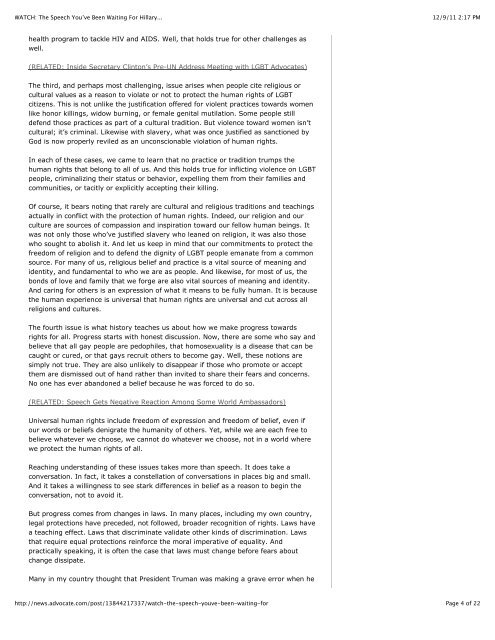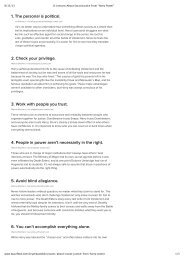Secretary of State Hillary Rodham Clinton Advocating ... - ODEC Home
Secretary of State Hillary Rodham Clinton Advocating ... - ODEC Home
Secretary of State Hillary Rodham Clinton Advocating ... - ODEC Home
You also want an ePaper? Increase the reach of your titles
YUMPU automatically turns print PDFs into web optimized ePapers that Google loves.
WATCH: The Speech You’ve Been Waiting For <strong>Hillary</strong>...<br />
12/9/11 2:17 PM<br />
health program to tackle HIV and AIDS. Well, that holds true for other challenges as<br />
well.<br />
(RELATED: Inside <strong>Secretary</strong> <strong>Clinton</strong>’s Pre-UN Address Meeting with LGBT Advocates)<br />
The third, and perhaps most challenging, issue arises when people cite religious or<br />
cultural values as a reason to violate or not to protect the human rights <strong>of</strong> LGBT<br />
citizens. This is not unlike the justification <strong>of</strong>fered for violent practices towards women<br />
like honor killings, widow burning, or female genital mutilation. Some people still<br />
defend those practices as part <strong>of</strong> a cultural tradition. But violence toward women isn’t<br />
cultural; it’s criminal. Likewise with slavery, what was once justified as sanctioned by<br />
God is now properly reviled as an unconscionable violation <strong>of</strong> human rights.<br />
In each <strong>of</strong> these cases, we came to learn that no practice or tradition trumps the<br />
human rights that belong to all <strong>of</strong> us. And this holds true for inflicting violence on LGBT<br />
people, criminalizing their status or behavior, expelling them from their families and<br />
communities, or tacitly or explicitly accepting their killing.<br />
Of course, it bears noting that rarely are cultural and religious traditions and teachings<br />
actually in conflict with the protection <strong>of</strong> human rights. Indeed, our religion and our<br />
culture are sources <strong>of</strong> compassion and inspiration toward our fellow human beings. It<br />
was not only those who’ve justified slavery who leaned on religion, it was also those<br />
who sought to abolish it. And let us keep in mind that our commitments to protect the<br />
freedom <strong>of</strong> religion and to defend the dignity <strong>of</strong> LGBT people emanate from a common<br />
source. For many <strong>of</strong> us, religious belief and practice is a vital source <strong>of</strong> meaning and<br />
identity, and fundamental to who we are as people. And likewise, for most <strong>of</strong> us, the<br />
bonds <strong>of</strong> love and family that we forge are also vital sources <strong>of</strong> meaning and identity.<br />
And caring for others is an expression <strong>of</strong> what it means to be fully human. It is because<br />
the human experience is universal that human rights are universal and cut across all<br />
religions and cultures.<br />
The fourth issue is what history teaches us about how we make progress towards<br />
rights for all. Progress starts with honest discussion. Now, there are some who say and<br />
believe that all gay people are pedophiles, that homosexuality is a disease that can be<br />
caught or cured, or that gays recruit others to become gay. Well, these notions are<br />
simply not true. They are also unlikely to disappear if those who promote or accept<br />
them are dismissed out <strong>of</strong> hand rather than invited to share their fears and concerns.<br />
No one has ever abandoned a belief because he was forced to do so.<br />
(RELATED: Speech Gets Negative Reaction Among Some World Ambassadors)<br />
Universal human rights include freedom <strong>of</strong> expression and freedom <strong>of</strong> belief, even if<br />
our words or beliefs denigrate the humanity <strong>of</strong> others. Yet, while we are each free to<br />
believe whatever we choose, we cannot do whatever we choose, not in a world where<br />
we protect the human rights <strong>of</strong> all.<br />
Reaching understanding <strong>of</strong> these issues takes more than speech. It does take a<br />
conversation. In fact, it takes a constellation <strong>of</strong> conversations in places big and small.<br />
And it takes a willingness to see stark differences in belief as a reason to begin the<br />
conversation, not to avoid it.<br />
But progress comes from changes in laws. In many places, including my own country,<br />
legal protections have preceded, not followed, broader recognition <strong>of</strong> rights. Laws have<br />
a teaching effect. Laws that discriminate validate other kinds <strong>of</strong> discrimination. Laws<br />
that require equal protections reinforce the moral imperative <strong>of</strong> equality. And<br />
practically speaking, it is <strong>of</strong>ten the case that laws must change before fears about<br />
change dissipate.<br />
Many in my country thought that President Truman was making a grave error when he<br />
http://news.advocate.com/post/13844217337/watch-the-speech-youve-been-waiting-for<br />
Page 4 <strong>of</strong> 22




